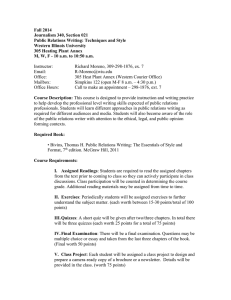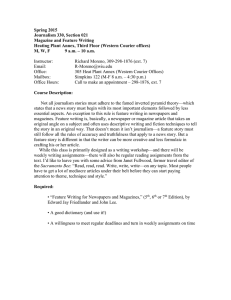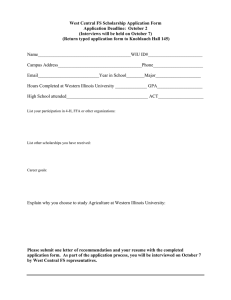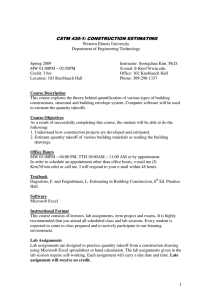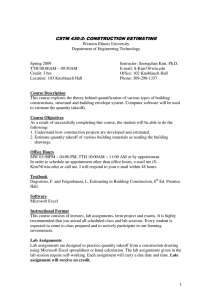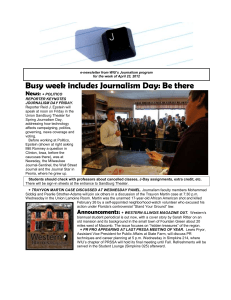Fall 2014 Journalism 332, Section 021 Sports Writing Western Illinois University
advertisement
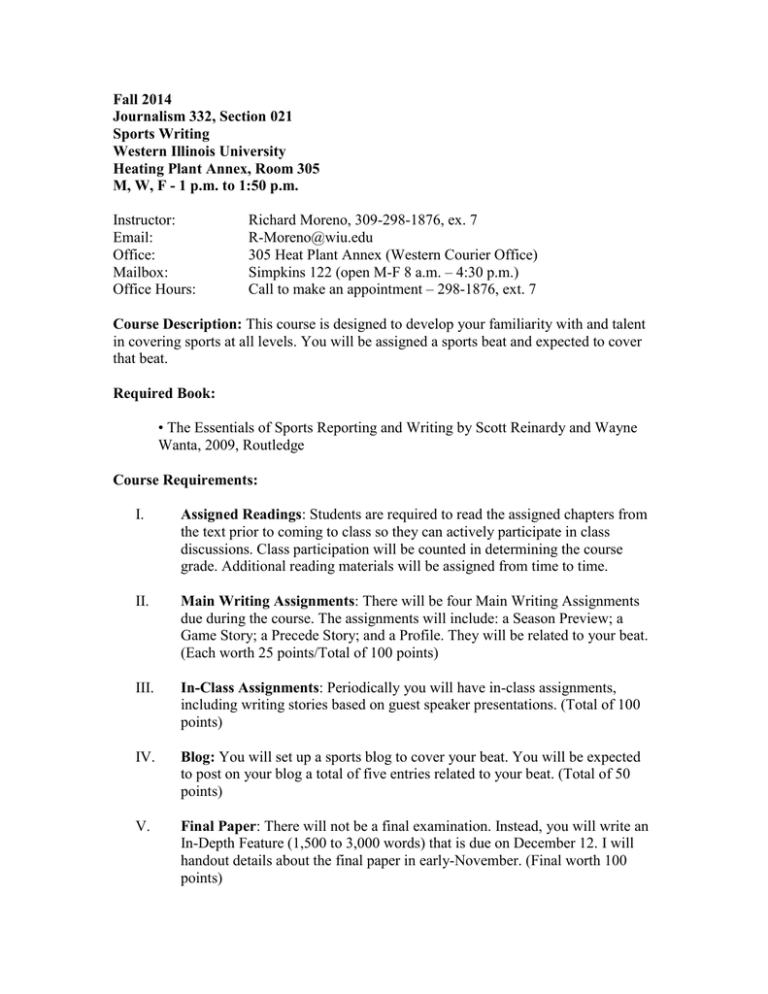
Fall 2014 Journalism 332, Section 021 Sports Writing Western Illinois University Heating Plant Annex, Room 305 M, W, F - 1 p.m. to 1:50 p.m. Instructor: Email: Office: Mailbox: Office Hours: Richard Moreno, 309-298-1876, ex. 7 R-Moreno@wiu.edu 305 Heat Plant Annex (Western Courier Office) Simpkins 122 (open M-F 8 a.m. – 4:30 p.m.) Call to make an appointment – 298-1876, ext. 7 Course Description: This course is designed to develop your familiarity with and talent in covering sports at all levels. You will be assigned a sports beat and expected to cover that beat. Required Book: • The Essentials of Sports Reporting and Writing by Scott Reinardy and Wayne Wanta, 2009, Routledge Course Requirements: I. Assigned Readings: Students are required to read the assigned chapters from the text prior to coming to class so they can actively participate in class discussions. Class participation will be counted in determining the course grade. Additional reading materials will be assigned from time to time. II. Main Writing Assignments: There will be four Main Writing Assignments due during the course. The assignments will include: a Season Preview; a Game Story; a Precede Story; and a Profile. They will be related to your beat. (Each worth 25 points/Total of 100 points) III. In-Class Assignments: Periodically you will have in-class assignments, including writing stories based on guest speaker presentations. (Total of 100 points) IV. Blog: You will set up a sports blog to cover your beat. You will be expected to post on your blog a total of five entries related to your beat. (Total of 50 points) V. Final Paper: There will not be a final examination. Instead, you will write an In-Depth Feature (1,500 to 3,000 words) that is due on December 12. I will handout details about the final paper in early-November. (Final worth 100 points) VI. Attendance and Class Participation: In regards to Attendance, each unexcused absence costs 5 points from your overall grade point total. Seek “excused” status for any absences within a week of the absence. As far as Class Participation, a total of 50 points will be awarded for participating in class discussions, including discussing the assigned readings. (Total of 50 points) These components total 400 points. Grades will be calculated by percentage using the following scale: A 92 percent or above A- 89-91 percent B+ 86-88 percent B 82-85 percent B- 79-81 percent C+ 76-78 percent C 72-75 percent C- 69-71 percent D+ 66-68 percent D 62-65 percent D- 59-61 percent F 58 percent or less 368 points or above 356-367 344-355 328-343 316-327 304-315 288-303 276-287 264-275 248-263 236-247 235 or below OTHER: • Decorum—Students will use respectful classroom etiquette toward both the instructor and your classmates. • Cheating and Plagiarism—Plagiarism will not be tolerated in this course. Any student caught plagiarizing will receive an automatic “0” on that assignment. Plagiarism is defined as the use of another’s ideas, data, and statements with little or no acknowledgement. Additionally, it is not acceptable to turn-in an assignment completed for another course. For more details, please read the “Academic Integrity” policy at www.wiu.edu/provost/student. • Useful Resources: University Writing Centers: Malpass Library 3rd Floor, West Side Open Monday-Friday 9 a.m. to 4 p.m. 309-298-2815 mwcenter@wiu.edu Simpkins Hall, Room 25 Open Monday-Friday 10 a.m. to 3 p.m. (Walk-ins Welcome) 309-298-3512 • Assistance Students with special learning needs requiring pedagogical accommodation should let me know as soon as possible. The University’s policy is that, in accordance with the Americans with Disabilities Act, academic accommodations may be made for any student who notifies the instructor of the need for an accommodation. It is imperative that the student takes the initiative to bring such needs to the instructor’s attention, as he is not legally permitted to inquire about such particular needs of students. Students who may require special assistance in emergency evacuations (i.e. fire, tornado, etc.) should contact the instructor as to the most appropriate procedures to follow in such an emergency. Contact Disability Support Services at 298-2512 for additional services. Web address for student rights & responsibilities: (http://www.wiu.edu/provost/students.php) Web address for Academic Integrity Policy: (http://www.wiu.edu/policies/acintegrity.php) About the Instructor: I am the Adviser to the Western Courier and Director of Student Publications. If you’re a Journalism major/minor (or even if you’re not), you should think seriously about writing for the Courier. I also serve as the Adviser to Western Illinois Magazine, a student-run twice-annual general interest magazine. You should be working for one or the other if you are serious about writing. Prior to coming to Western in 2006, I worked for 14 years as the Publisher/Editor of Nevada Magazine, a bimonthly travel and tourism publication. From 2004 to 2006, I taught Travel Journalism at the Donald Reynolds School of Journalism at the University of Nevada, Reno. Additional Background: • I am the author of twelve non-fiction travel and/or history books including “The Roadside History of Nevada,” “A Short History of Carson City, Nevada,” and “Illinois Curiosities.” My newest book, “Myths and Mysteries of Illinois,” was published last August. • In 2007, I was honored with the Nevada Writers Hall of Fame’s “Silver Pen Award.” • From 1985 to 1992, I was Director of Advertising and Public Relations for the Nevada Commission on Tourism and created the “I Survived Highway 50, the Loneliest Road in America” promotion, which was awarded best state tourism public relations campaign by the National Council of State Travel Directors. • From 1980 to 1985, I worked as a reporter at several newspapers including the Reno Gazette-Journal, the Davis Enterprise and the Montclarion in Oakland. Calif. I also wrote a travel-history column for more than two decades for several Nevada newspapers. • I have a master’s degree (M.S). in journalism from Columbia University’s Graduate School of Journalism in New York and an undergraduate degree in political science from the University of California at Davis.
